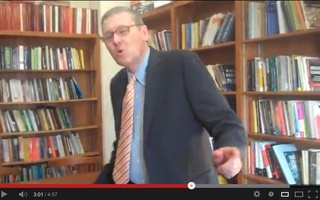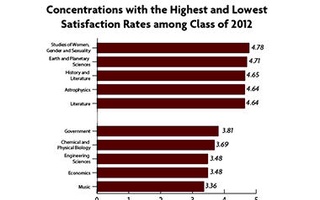Almost every academic department within the Faculty of Arts and Sciences saw its concentration satisfaction scores increase from 2002 to 2010.
Scored on a five-point scale, overall concentration satisfaction jumped half a point over the past eight years, which many department administrators attributed to University and FAS initiatives to encourage better teaching and advising in the College.
“I think that General Education courses have been vetted so thoroughly that they too are improved and faculty have been rejuvenated by having to imagine their courses anew,” Professor of Social Ethics and Head Tutor of Psychology Mahzarin R. Banaji wrote in an e-mailed statement.
Senior survey results from the class of 2010, published in early January, revealed these increases.
Every concentration has seen an increase in its satisfaction score since 2002, with anthropology seeing the lowest increase, rising by only .12 points.
The relative scores among concentrations remained largely unaltered during the period, with economics, the largest concentration, starting and ending the eight-year period near the bottom.
“We work really hard to try to respond to these results every year and add more programming and change around what we do,” Economics Undergraduate Program Administrator Emily R. Neill said.
But Neill said that sometimes these initiatives falter.
“We brought back junior seminars this past year, after seniors complained about not having them, and we thought that this was it. This was going to boost our numbers,” Neill said.
“We had 68 slots open; 34 people registered,” she said.
But, Neill said, efforts to build a stronger community of economics concentrators have helped to better connect undergraduates with the department and their advisers.
“I cranked the hell out of that message to get students in Littauer and feeling like they’re part of a larger community, and I think that we’re beginning to see a change as a result of that, with the Class of 2010,” Neill said.
Neill added that she hopes to see further increases in economic concentration satisfaction scores soon, but said it is difficult to determine exactly which elements of the many curricular and academic reforms passed in the last three years are responsible for the increasing scores.
“I can’t tell you how depressing it is for it not to go up,” Neill said. “I’m psyched it went up, and I hope it stays up.”
The English department, which received the highest concentration satisfaction score among concentrations with more than 50 undergraduates, recently implemented a major reform to its curriculum. Administrators largely attributed the rise in English satisfaction numbers from 3.81 to 4.44—a higher than average increase—to this curricular revision.
“The department was ready for a change,” English Undergraduate Program Administrator Jeffrey Berg said. “I think there was a general encouragement across the College to examine what we were doing in each department.”
English Department Chair W. James Simpson said that support from FAS Dean Michael D. Smith provided a framework to continue improving undergraduate education.
“I think it is due to an increasing emphasis [on teaching and learning],” Simpson said. “Certainly Dean Smith has helped.... The University administration worked very collaboratively in restructuring the department.”
Some departments saw minor decreases in their satisfaction scores since the last academic year, including classics, Organismic and Evolutionary Biology, and History and Literature, but these departments constituted an anomaly in the FAS-wide trend.
Many of the departments that experienced decreases in their satisfaction ratings are smaller, and therefore are more likely to see fluctuations from year to year.
—Staff writer Gautam S. Kumar can be reached at gkumar@college.harvard.edu.
—Staff writer Sirui Li can be reached at sli@college.harvard.edu.
Read more in News
Student Sustainability Grants AwardedRecommended Articles
-
 Dining Halls Expect Updated Menu
Dining Halls Expect Updated Menu -
 Economics Department Releases New T-Shirt
Economics Department Releases New T-Shirt -
History and Literature Boasts Highest Satisfaction RatingThe 2011 concentration satisfaction scores for history and literature edged past those of the English department, which had the highest satisfaction score among large concentrations in 2010, according to the FAS records of the 2011 Exit Surveys.
-
 Before This Video Came Into Our Lives, We Missed It So Bad
Before This Video Came Into Our Lives, We Missed It So Bad -
 Smaller Concentrations Receive Highest Satisfaction Ratings
Smaller Concentrations Receive Highest Satisfaction Ratings -
Students UnsatisfiedIn order to best learn from this survey, the College should note that two main factors loosely correlate with a concentration’s popularity: the concentration’s size and the category in which it falls within the arts and sciences.













